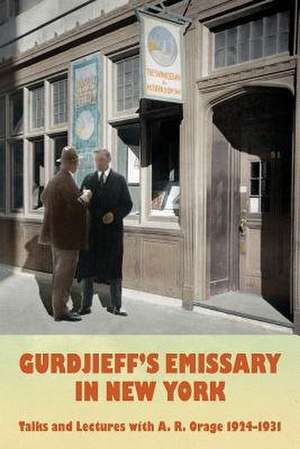Gurdjieff's Emissary in New York
Autor A. R. Orage Ilustrat de Matthias Buck-Gramcko Cuvânt înainte de David Kherdianen Limba Engleză Paperback
Gurdjieff claimed to have found a way to develop new and higher faculties, and to have been trained in the necessary methods and knowledge which had its sources in the hidden wisdom of the East. Orage worked intensively for more than a year with Gurdjieff in his Institute for the Harmonious Development of Man, and it seems that he had found what he was seeking.
Gurdjieff, on the other hand, found in Orage someone whom he considered a brother in spirit. A spirit that was defined by Orage some years before as: ". . . displaying itself in disinterested interest in things; in things, that is to say, of no personal advantage, but only of general, public or universal importance." When Gurdjieff expanded his activities into the New World, it was only consequent that Orage became his emissary there.
Orage arrived in New York in December 1923 to expound Gurdjieff's ideas, and until 1931, was talking to a growing group of interested people. This book contains the notes of many of these talks. We are grateful to the notetakers and their prudence to leave their papers to the universities of Yale, Berkeley and Leeds, who guaranteed the survival of these papers in their archives. Without all this combined effort, they would otherwise be scattered all over the world, largely unknown and "upon the verge of being irrecoverably lost" as C. Daly King once wrote. Along with Orage's Commentary on "Beelzebub's Tales to His Grandson," this edition completes the record of Orage's meetings, talks and lectures on Gurdjieff's teaching.
Illustrated with 130 line drawings and 37 photographsPreț: 234.16 lei
Nou
44.82€ • 48.70$ • 37.67£
Carte tipărită la comandă
Livrare economică 21 aprilie-05 mai
Specificații
ISBN-10: 099547561X
Pagini: 634
Dimensiuni: 152 x 229 x 36 mm
Greutate: 0.92 kg
Notă biografică
British editor and critic, born at Dacre in Yorkshire; he taught in Leeds after training at a college in Culham, Oxfordshire. His interest in the cultural implications of socialism led him to found the Leeds Arts Club with Holbrook Jackson. His early publications include the monograph Friedrich Nietzsche (1905). In 1906 he became a journalist in London and took over the New Age in association with Jackson in 1907. His critical writings for the periodical emphasize the ethical and social functions of literature and contain close textual readings which anticipate the development of analytical criticism in the 1920s. The New Age remained a central forum for literary discourse until around 1920, when Orage became immersed in the teachings of Gurdjieff, whose Meetings with Remarkable Men (1963) he translated. Between 1922 and 1930 he was active as a fund-raiser for the Gurdjieff Institute in Fontainebleau. In 1931 he founded the New English Weekly, the chief organ of the Social Credit movement. His Political and Economic Writings (1935) were edited by Montgomery Butchart. 'The New Age' under Orage (1967) is by Wallace Martin, who edited Orage as Critic (1974), a selection of his critical work.
